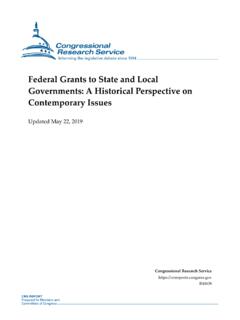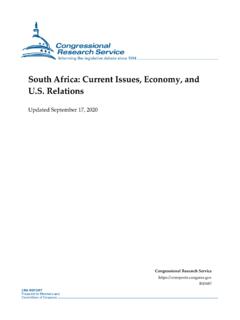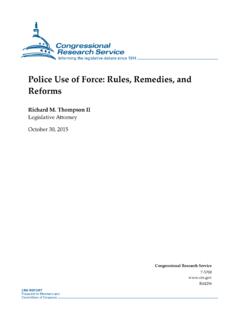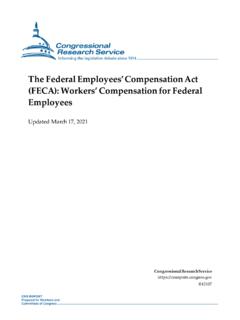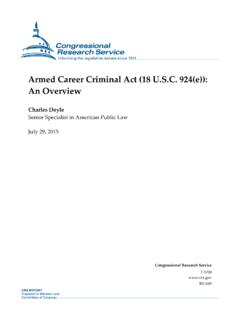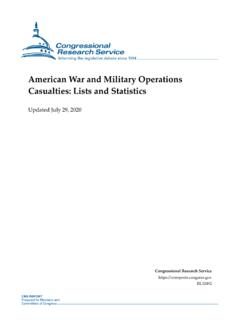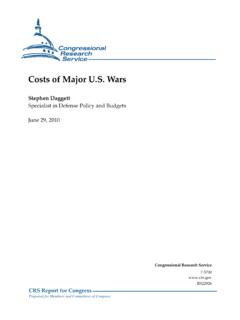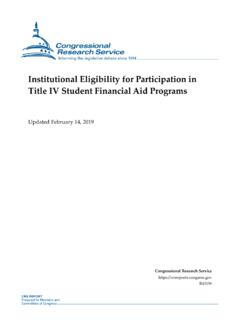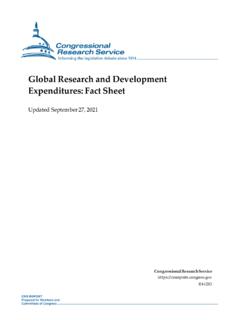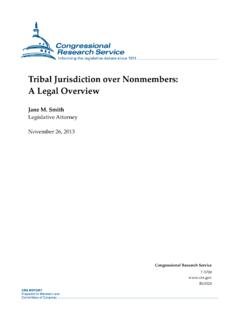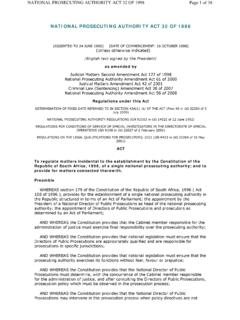Transcription of The Posse Comitatus Act and Related Matters: The Use of ...
1 The Posse Comitatus Act and Related Matters: The Use of the Military to Execute Civilian Law Updated November 6, 2018 Congressional Research Service R42659 The Posse Comitatus Act and Related Matters Congressional Research Service Summary The Constitution permits Congress to authorize the use of the militia to execute the Laws of the Union, suppress Insurrections and repel Invasions. And it guarantees the states protection against invasion or usurpation of their republican form of government, and, upon the request of the state legislature, against domestic violence. These constitutional provisions are reflected in the Insurrection Acts, which have been invoked numerous times both before and after passage of the Posse Comitatus Act, 18 Section 1385, in 1878. Congress has also enacted a number of statutes that authorize the use of land and naval forces to execute their objective. The Posse Comitatus Act outlaws the willful use of any part of the Army or Air Force to execute the law unless expressly authorized by the Constitution or an act of Congress.
2 History supplies the grist for an argument that the Constitution prohibits military involvement in civilian affairs subject to only limited alterations by Congress or the President, but the courts do not appear to have ever accepted the argument unless violation of more explicit constitutional command could also be shown. The express statutory exceptions include the legislation that allows the President to use military force to suppress insurrection or to enforce federal authority, 10 Sections 251-255, and laws that permit the Department of Defense to provide federal, state and local police with information, equipment, and personnel, 10 271-284. Case law indicates that execution of the law in violation of the Posse Comitatus Act occurs (a) when the Armed Forces perform tasks assigned to an organ of civil government, or (b) when the Armed Forces perform tasks assigned to them solely for purposes of civilian government. Questions concerning the act s application arise most often in the context of assistance to civilian police.
3 At least in this context, the courts have held that, absent a recognized exception, the Posse Comitatus Act is violated when (1) civilian law enforcement officials make direct active use of military investigators; or (2) the use of the military pervades the activities of the civilian officials; or (3) the military is used so as to subject citizens to the exercise of military power which was regulatory, prescriptive, or compulsory in nature. The act is not violated when the Armed Forces conduct activities for a military purpose. The language of the act mentions only the Army and the Air Force, but it is applicable to the Navy and Marines by virtue of administrative action and commands of other laws. The law enforcement functions of the Coast Guard have been expressly authorized by act of Congress and consequently cannot be said to be contrary to the act. The act has been applied to the National Guard when it is in federal service, to civilian employees of the Armed Forces, and to off-duty military personnel.
4 The act probably only applies within the geographical confines of the United states , but supplemental provisions of 10 271-284 appear to apply worldwide. Finally, the act is a criminal statute under which there has been but a handful of known prosecutions. Although violations will on rare occasions result in the exclusion of evidence, the dismissal of criminal charges, or a civil cause of action, as a practical matter compliance is ordinarily the result of military self-restraint. This report provides an historical analysis of the use of the Armed Forces to execute domestic law and of the Posse Comitatus Act, including their apparent theoretical and constitutional underpinnings. The report then outlines the current application of the act as well as its statutory exceptions, and reviews the consequences of its violation. This report appears in abridged form as CRS Report R42669, The Posse Comitatus Act and Related Matters: A Sketch. The Posse Comitatus Act and Related Matters Congressional Research Service Contents Introduction.
5 1 Background .. 2 The Use of Federal Troops Prior to 1878 .. 5 The Insurrection Act and Other Statutes .. 7 Resistance to Taxes and Duties .. 9 Neutrality Act Enforcement .. 10 Requests from states for Military Aid .. 11 Trouble in the Western states and Territories .. 15 Slavery, the Civil War, and Reconstruction .. 16 Use of Military Forces as a Posse Comitatus .. 17 Passage of the Posse Comitatus Act .. 21 Constitutional Considerations .. 23 Constitutional Origins .. 23 Presidential vs. Congressional Powers .. 26 Constitutional Exceptions .. 28 When the Posse Comitatus Act Does Not Apply .. 30 Statutory Exceptions .. 31 Generally .. 31 The Insurrection Acts .. 34 Support to Law Enforcement .. 42 Military Purpose .. 49 Coverage of the Posse Comitatus Act .. 55 Willful Use .. 55 Execute the Law .. 56 Military Coverage .. 59 Navy & Marines .. 59 Coast Guard .. 60 National Guard .. 61 Off Duty Military, Acting as Citizens & Civilian Employees.
6 62 Geographical Application .. 64 Consequences of Violation .. 66 Prosecution .. 66 Exclusion of Evidence .. 66 Jurisdiction & Criminal Defenses .. 68 Civil Liability .. 69 Compliance .. 70 Contacts Author Information .. 70 Acknowledgments .. 70 The Posse Comitatus Act and Related Matters Congressional Research Service R42659 VERSION 7 UPDATED 1 Whoever, except in cases and under circumstances expressly authorized by the Constitution or Act of Congress, willfully uses any part of the Army or the Air Force as a Posse Comitatus or otherwise to execute the laws shall be fined under this title or imprisoned not more than two years, or both. 18 1385. Introduction Americans have a tradition, born in England and developed in the early years of our nation, that abhors military involvement in civilian affairs, at least under ordinary circumstances. It finds its most tangible expression in the 19th century Posse Comitatus Act, 18 Section 1385, which forbids use of the Army and (as amended) the Air Force to execute civil law except where expressly authorized.
7 The exception documents a contrary component of the tradition. Congress has expressly approved the use of the Armed Forces in extraordinary circumstances or where federal manpower to enforce the law was seen as inadequate. Striking the balance between rule and exception has never been easy, but failure to do so has often proven unfortunate. If the rule is too unforgiving, a Shays s Rebellion may go unchecked. If exceptions are too generously granted, a Boston Massacre or Kent State tragedy may follow. The terrorist attacks against the United states in September 2001 produced some calls for more generous exceptions to the The USA PATRIOT Act2 broadened the permissible circumstances for the use of the military to assist law enforcement agencies in countering terrorism,3 but Congress also reaffirmed its determination to maintain the principle of the Posse Comitatus The perceived breakdown in civil law and order in Hurricane Katrina s wake evoked more calls to reevaluate the military s role in responding to The possibility of using military surveillance equipment and resources, including unmanned aerial vehicles (drones), to assist civilian law enforcement has raised some objections based on the military This report provides an historical analysis of the use of the Armed Forces to execute domestic law and of the Posse Comitatus Act, including their apparent theoretical and constitutional underpinnings.
8 The report then outlines the current application of the Posse Comitatus Act as well as its statutory exceptions, and reviews the consequences of its violation. 1 See Nathan Canestaro, Homeland Defense: Another Nail in the Coffin for Posse Comitatus , 12 WASH. U. & POL Y 99, 100 (2003) ( Some politicians and media sources now suggest that Congress amend or even repeal the PCA to allow a degree of domestic military involvement that would have been unthinkable five years ago. ). For a review of the changed role of the military, see William C. Banks, The Normalization of Homeland Security after September 11: The Role of the Military in Counterterrorism Preparedness and Response, 64 LA. L. REV. 745 (2004). 2 Pub. L. No. 107-56, 115 Stat. 272 (2001). 3 Id. 104 (amending 18 2332e). 4 Homeland Security Act of 2002, Pub. L. No. 107-296, 886, 116 Stat. 2248 (2002), codified at 6 466 (2018). 5 See Lisa Grow Sun, Disaster Mythology and the Law, 96 CORNELL L.
9 REV. 1131 (2011); Jerald A. Sharum, The Politics of Fear and Outsourcing Emergency Powers: The Death and Rebirth of the Posse Comitatus Act, 37 LINCOLN L. REV. 111 (2009-2010);, William C. Banks, Providing Supplemental Security The Insurrection Act and the Military Role in Responding to Domestic Crises, 3 J. NAT'L SECURITY L. & POL'Y 39 (2009) (all three articles recounting history behind the short-lived amendment to the Insurrection Act enacted in response to Hurricane Katrina). 6 Canestaro, supra, note 1, at 100 (arguing that numerous exceptions for military support of civil authorities have taken their toll on the [ Posse Comitatus Act s] strength ). The Posse Comitatus Act and Related Matters Congressional Research Service R42659 VERSION 7 UPDATED 2 Background The Magna Carta provides the first recorded acknowledgment of the origins of the Anglo-American tradition against military involvement in civilian affairs with its declaration that no free man shall be.
10 Imprisoned .. or in any other way destroyed .. except by the legal judgment of his peers or by the law of the land. 7 Subsequent legislation in the reign of Edward III explained that this precluded punishment by the King except in due Manner .. or by Process made by Writ .. [or] by Course of the Law, 8 or as later more simply stated, except by due Process of the Law. 9 Three hundred years after the passage of the Edwardian statutes, Lord Coke and other members of Parliament read these due process and law of the land requirements to include a broad prohibition against the use of martial law in peacetime, an interpretation they compelled King Charles I to King Charles I, preparing for a military expedition in France, had quartered his troops in homes along the southern English Rioting resulted, and the participants, both military and civilian, were tried and punished by commissioners operating under the authority of martial law. Offended by this peacetime exercise of military judicial authority over civilians, Parliament sought and was granted the Petition of Right of 1628, which outlawed both quartering and martial law 7 Magna Carta, ch.
